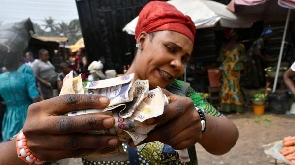 Market woman hold money wey traders reject for Awgbu market for Anambra
Market woman hold money wey traders reject for Awgbu market for Anambra
From begging to threats of arrest, govnors for different Nigerian states dey try use different tactics to make pipo for dia states begin accept di old naira notes.
Since di Supreme Court one week ago order di federal goment of Nigeria to extend di use of di old currencies of 500 and 1,000 as legal tender till 31 December 2023, Nigerians dey confused on di status of di old notes.
Both goment and di Central Bank of Nigeria neva tok anytin since dat time.
Banks, eateries, filling stations, traders and many oda businesses still no dey gree collect di old 500 and 1,000 notes across di kontri.
Dis development make some state govnors try to step in as dem try to make pipo for dia state to accept di old money.
Govnors like Ekiti state Biodun Oyebanji, Bayelsa state Douye Diri and Ondo state Rotimi Akeredolu, through state broadcast and press release appeal to dia pipo for dia state, beg dem to collect di old notes so as to reduce di “suffering of di common man.
While govnors like Yahaya Bello of Kogi state and Imo state govnor Hope Uzodimma, accuse pipo wey no gree use di money say dem dey “disobedient” to di Supreme Court judgement.
Di Kogi govnor threaten to arrest pipo wey no gree collect di old currency and to seal any bank wey no comply wit di order.
Major wahala wit goment appeal
Three major wahala wey dey face dis govnors appeal and threats for pipo to use di old naira notes dey two.
First, di pipo wey di govnors dey appeal to - banks, filling stations, and eateries - to obey di law, say no be dem di Supreme Court give order to resume di use of old currency, di court order na to federal goment. Meaning say na di president court give order.
Di oda one na say some of dis business like di banks wey dem dey threaten to close, no get power to decide at branch levels say dem wan transact wit old notes becos dem dey under a federal regulator wey be di Central Bank of Nigeria (CBN).
Di banks position get bigger implications becos e mean say traders, supermakets, schools plus oda businesses no fit deposit di old notes wey dem collect from customers to dia accounts for banks.
Third, be say, dis govnors no get constitutional power to instruct di pipo on wetin go be legal tender. Diafore, dem really no get di constitutional backing to enforce di order.
So who get di power to order Nigerians to use old notes?
Di Nigeria Constitution dey very clear about how agencies like di Central Bank of Nigeria suppose operate.
Di law wey establish CBN wey be di Central Bank of Nigeria Act section 1(3) make di bank “independent body in di discharge of im duty.”
For section 20(3) di Act give di CBN di full power to, based on di order of di president, to stop any currency from being legal tender.
“Di bank go get di power, if di president order am to do so and afta e give reasonable notice on dat behalf, to call in any of im notes or coins on payment of di face value and any note or coin wey e bin don give notice under dis Sub-section, go, wen di notice expire, stop to be legal tender.”
So, dis mean say, CBN dey only take order from di president on mata wey concern di currency of di kontri.
Supreme Court judgement palava
E no get any reason why any Nigerian no fit to sue di CBN imsef if dem no satisfy wit wetin di bank dey do.
According to di CBN Act section 1(2), e possible to sue di bank and di bank fit sue too.
So why for dis particular case e be like CBN no send wetin di Supreme Court order?
Di tin be say, for di case wey three APC govnors of Kaduna, Zamfara and Kogi state carry go court, dem make di case to be between di federal goment and di state goments. CBN name no dey mentioned for di case.
Reason be say, according to di 1999 Constitution of di Federal Republic of Nigeria (as amended) section 25(1d), na only di Federal High Court of Nigeria get power to exercise jurisdiction on mata wey concern di Central Bank of Nigeria.
E mean say di Supreme Court as di highest court for di land suppose send di mata go di appropriate court, in which case CBN for no fit act like say di order to use old notes till December 31 no concern am.
However, dis sections of di law don lead to plenty argument among lawyers as some argue for and odas against.
For all dis, di lacuna or different legal interpretations to di wetin di constitution tok, don leave di common man on di street for di middle of wey be like di fight between two elephants.
On 3 March Supreme Court of Nigeria don reverse di CBN policy on new notes.
Di apex court deliver di judgement afta dem bin adjourn di case wey challenge di federal goment implementation of di naira swap policy wey some state goments bring before am.
For di lead judgement by Justice Emmanuel Agim, court rule say di old 1000, 500 and 200 naira notes go run till 31 December, 2023.
Di court also add say "di cash limits no fit dey justified and di disobedience of court order by di president na sign of failure of our democracy."
Di apex court hold say even though President Buhari get executive power im go against di constitution as im no consult di Federal Executive Council, di National Economic Council before im give di directive.